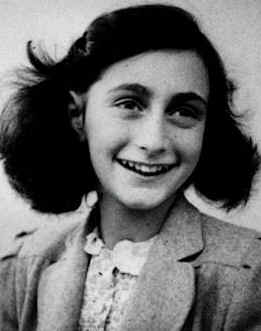The Lilith Blog 1 of 2
May 1, 2014 by Maya Zinkow
Protecting Anne Frank
 I’ve never been able to keep a diary. When I was young, I often tried over and over again; I made New Year’s resolutions to write every day, bought beautifully decorated journals, kept pens on my bedside table in the hope that they would remind me to jot down my thoughts just before sleep. I always had a penchant for writing, but there was something about the commitment to a notebook, something about being accountable to an object that always kept me from harnessing a routine.
I’ve never been able to keep a diary. When I was young, I often tried over and over again; I made New Year’s resolutions to write every day, bought beautifully decorated journals, kept pens on my bedside table in the hope that they would remind me to jot down my thoughts just before sleep. I always had a penchant for writing, but there was something about the commitment to a notebook, something about being accountable to an object that always kept me from harnessing a routine.
In eighth grade, we were assigned to read The Diary of Anne Frank, a ritual for most (if not all) American children. I was eager to delve into the mind of the girl who, for me, had become the face of the Shoah, that famous photo – eyes looking upward, thick hair perfectly pinned, a hopeful smile spread across her face – forever imprinted in my memory. I read hungrily, turning each page with an expectation to find something extraordinary, something that I was not expecting.
While undeniably astute for her age, I recall my disappointment and discomfort in the realization that this girl was just like me. She had a crush, she had fears, she had questions about growing up, she had problems with her mother. When we discussed the book in class, I felt panicked; as the only Jew in my class, it suddenly felt as if my classmates were reading my diary, were reading my personal thoughts and fears and talking about what themes they found in my writing, what interesting tidbits stood out. But it isn’t meant to be read like this, I thought. This is her diary. I felt invasive, sad, and protective of this girl who had lived in a different place and a different time. This girl whose thoughts had become America’s gateway into Holocaust education.
Though my days of nervously sweating in English class as young WASP goddesses tried to discuss anti-Semitism without giving a glance my way are far behind me, I still find myself uncomfortable and unsettled every time I see a book or a play or a movie that somehow tries to simplify this young girl even further. Yom Hashoah brings back my protective instincts, and this year I am thinking about Anne more than ever.
This May will mark two years since the death of Marina Keegan, the young woman whose beautiful face was plastered all over my Facebook newsfeed within days of her graduation from Yale and her untimely death in an auto accident. Marina, a dear friend of my sister’s, was a brilliant writer, and we all now have the chance to experience that brilliance. The new book The Opposite of Loneliness, now being widely reviewed, is a compilation of Marina’s essays and stories, and it is a tribute to a beautiful life cut far too short. As I am finding Marina’s face all over once again – framed by auburn hair, eyes staring head on, a knowing smirk spread across her face – I feel grateful for the opportunity to understand her a bit more, to read the things she always meant for us to read. To keep her stories from the public would be to tarnish her memory. Though Marina’s written legacy is certainly in a different category than Anne Frank’s, Marina’s posthumous book has caused me to reevaluate my long-time discomfort with the famous diary.
On the first night of Pesach, my father had my young cousin read aloud an excerpt from the famous diary. She reluctantly read the small paragraph that contained one of the diary’s most famous entries: “In spite of everything, I still believe that people are really good at heart.” Anne’s words hung in the air above the leftover brisket, the seder plate, and my extended family. I thought about my twelve-year-old cousin, I thought about myself at the same age, I thought about Anne, and I thought about Marina.
Let us read on; to honor them, to learn from them, and to better the world they have left to us.
 Please wait...
Please wait...